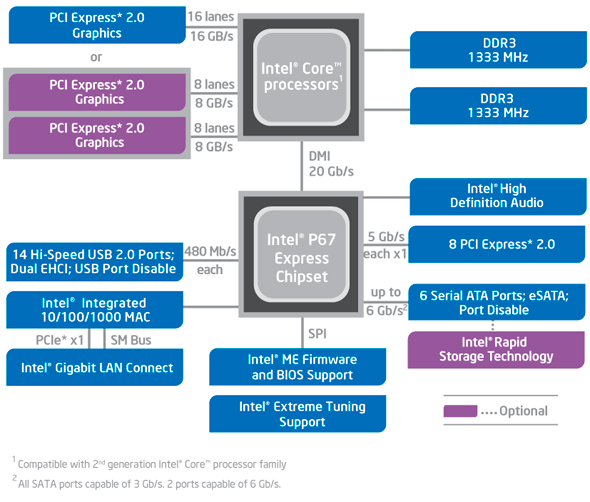Intel Discovers Flaw In Latest Motherboard Chipset, Halts Production
Intel announced this morning that it's been forced to stop shipping existing Sandy Bridge motherboards. The company recently discovered a design issue in its P67 (Cougar Point) chipset that, over time, could cause SATA performance to degrade and possibly fail altogether. The problem only affects older 3G SATA ports—Intel's 6G implementation is unaffected—but it's going to take several weeks for the company to implement and ramp the new motherboard revision.
During its press conference, Intel explained that the erratum only appeared after its extensive validation process had concluded. Once Intel signs off of a chipset, it ships motherboards to OEMs who begin their own verification process. Companies like Dell or HP take a number of motherboards and subject them to additional stress in order to age them at an accelerated rate. This process still takes a distinct period of time; Intel claims it was unaware of the problem when it launched Sandy Bridge a few weeks ago. The SATA degradation/failure only begins to appear on boards at the three-year-old mark and, according to Intel, only affects a single-digit percentage of all the motherboards its shipped (~8 million).
The flaw itself has already been identified and corrected; Intel is already producing the repaired version of the chipset. The company has stated that its other products (including mobile) for the rest of the year are unaffected, further chipset and product launches will proceed as scheduled. The errata will impact Sandy Bridge availability by several weeks—Intel expects to begin delivering the repaired chipsets in February with full volume recovery by April.

Intel's latest P67 chipset.
Santa Clara estimates this issue will knock approximately $300 million off Q1 revenue; the total cost of replacing affected systems is currently estimated at $700 million. As a result, Q1 gross margin will be down an estimated four percent from the record-setting 67.5 percent announced for Q4.
Customers who already own Sandy Bridge systems are advised to contact their OEMs for additional assistance and to reach out to Intel at its support page if they need additional assistance. The company stated this morning that the entire problem is chipset-related. Customers who just bought products shouldn't encounter even a whisper of a problem at this early stage, but if they do, there's no need to worry about the problem corrupting data previously copied to a hard disk or SSD.
Intel further expects that its previous generation of Core i5/i7 products will help close some of the gap between its original Q1 projections and its current estimates but the company wasn't willing to speculate how much. AMD might also win a small amount of revenue from the delay. While the company's current products are outperformed by 45nm Nehalem-class processors, customers who are unwilling to buy into what's essentially a dead platform now that Sandy Bridge has launched may instead opt for an AM3+Thuban combo now, knowing that they'll be able to take the chip forward into AM3+ boards once those are on the market. We're dubious, but it's at least possible.
While significant, this issue is little more than a brief misstep for Intel. The company does not expect it to materially affect yearly revenue in 2011.
During its press conference, Intel explained that the erratum only appeared after its extensive validation process had concluded. Once Intel signs off of a chipset, it ships motherboards to OEMs who begin their own verification process. Companies like Dell or HP take a number of motherboards and subject them to additional stress in order to age them at an accelerated rate. This process still takes a distinct period of time; Intel claims it was unaware of the problem when it launched Sandy Bridge a few weeks ago. The SATA degradation/failure only begins to appear on boards at the three-year-old mark and, according to Intel, only affects a single-digit percentage of all the motherboards its shipped (~8 million).
The flaw itself has already been identified and corrected; Intel is already producing the repaired version of the chipset. The company has stated that its other products (including mobile) for the rest of the year are unaffected, further chipset and product launches will proceed as scheduled. The errata will impact Sandy Bridge availability by several weeks—Intel expects to begin delivering the repaired chipsets in February with full volume recovery by April.

Intel's latest P67 chipset.
Santa Clara estimates this issue will knock approximately $300 million off Q1 revenue; the total cost of replacing affected systems is currently estimated at $700 million. As a result, Q1 gross margin will be down an estimated four percent from the record-setting 67.5 percent announced for Q4.
Customers who already own Sandy Bridge systems are advised to contact their OEMs for additional assistance and to reach out to Intel at its support page if they need additional assistance. The company stated this morning that the entire problem is chipset-related. Customers who just bought products shouldn't encounter even a whisper of a problem at this early stage, but if they do, there's no need to worry about the problem corrupting data previously copied to a hard disk or SSD.
Intel further expects that its previous generation of Core i5/i7 products will help close some of the gap between its original Q1 projections and its current estimates but the company wasn't willing to speculate how much. AMD might also win a small amount of revenue from the delay. While the company's current products are outperformed by 45nm Nehalem-class processors, customers who are unwilling to buy into what's essentially a dead platform now that Sandy Bridge has launched may instead opt for an AM3+Thuban combo now, knowing that they'll be able to take the chip forward into AM3+ boards once those are on the market. We're dubious, but it's at least possible.
While significant, this issue is little more than a brief misstep for Intel. The company does not expect it to materially affect yearly revenue in 2011.

